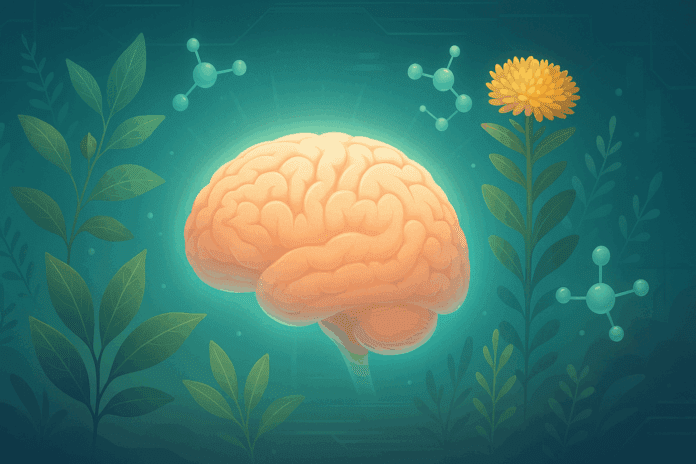The New Frontier of Mental Calm: Exploring Nootropics for Anxiety and Cognitive Longevity
In an age where mental performance is constantly pushed to its limits and chronic stress has become a daily companion, the search for safe, effective solutions to calm the mind has never been more urgent. While pharmaceutical interventions remain a cornerstone in the treatment of severe anxiety disorders, there is a growing interest in holistic and preventive approaches—particularly those that also support long-term cognitive resilience. This evolving landscape has brought nootropics for anxiety into sharp focus, not merely as tools for short-term stress relief but as potentially transformative agents in supporting overall brain health and longevity.
You may also like: Best Rated Nootropics for Brain Health: Top Supplements to Enhance Focus, Memory, and Longevity
The term “nootropic” traditionally referred to compounds that enhance learning and memory, but its modern usage encompasses a broader range of brain-boosting supplements designed to optimize mental performance, emotional stability, and neuroprotection. When it comes to anxiety, the best nootropics for anxiety are those that not only reduce acute stress and nervousness but also fortify the brain against the corrosive effects of chronic psychological strain. This dual benefit—immediate calm paired with long-term cognitive support—places nootropics in a unique position at the intersection of mental wellness and neuro-longevity.
To fully understand how nootropics may alleviate anxiety while preserving mental clarity and function over time, it’s important to delve into the neurobiology of stress and the pharmacological nuances of specific nootropic compounds. Anxiety is not just a fleeting emotion; it is a neurochemical cascade involving the amygdala, hypothalamic-pituitary-adrenal (HPA) axis, and key neurotransmitters like GABA, serotonin, dopamine, and glutamate. Many of the best nootropics for anxiety work by modulating these very systems, promoting balance rather than sedation, clarity rather than fog.
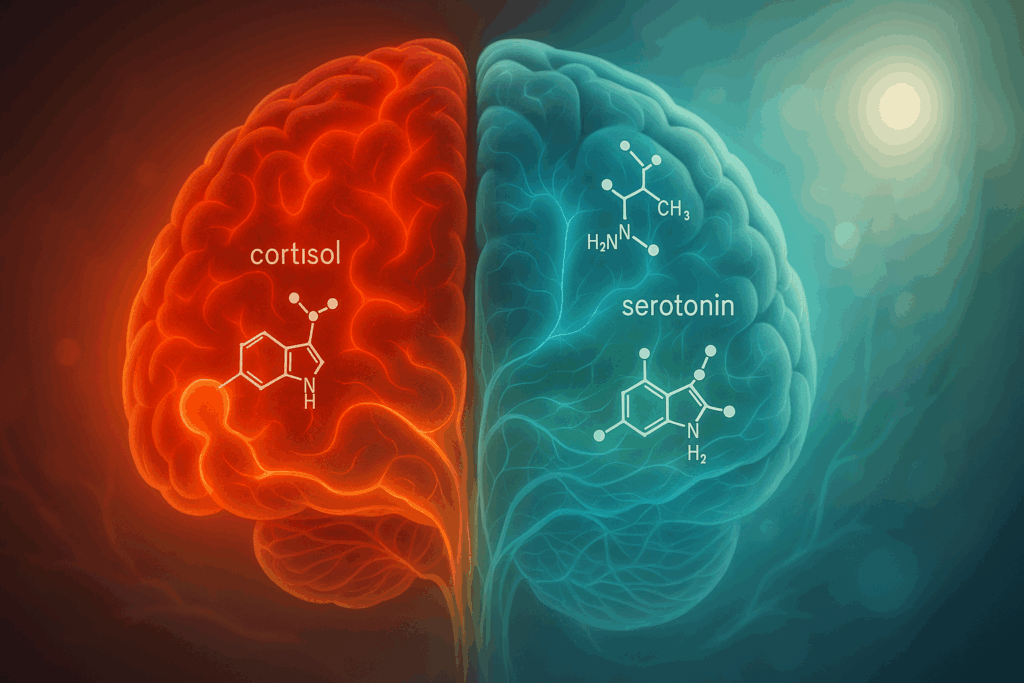
Understanding the Anxiety-Nootropic Connection: Why Brain Supplements May Offer More Than Just Relief
At the neurochemical level, anxiety is characterized by dysregulation across multiple systems. Overactivity in the amygdala leads to heightened emotional responses, while a poorly modulated HPA axis results in excessive cortisol release—the body’s primary stress hormone. Over time, elevated cortisol levels can damage the hippocampus, impair executive function, and accelerate cognitive aging. The best nootropics for anxiety target these mechanisms with precision, offering not just symptomatic relief but also protection against the cognitive consequences of chronic stress.
For instance, certain adaptogenic nootropics such as Rhodiola rosea and ashwagandha have been shown to normalize cortisol rhythms, reducing the neurotoxic effects of stress while simultaneously improving attention and mood stability. Others, like L-theanine and GABA, exert their anxiolytic effects through direct modulation of inhibitory neurotransmission, often without the sedating effects commonly associated with prescription anxiolytics. These compounds encourage a state of calm alertness—a cognitive sweet spot where anxiety is reduced but focus remains sharp.
Moreover, neuroinflammation and oxidative stress, both byproducts of long-term anxiety, are emerging as key drivers of cognitive decline. Many nootropics for anxiety also exhibit antioxidant and anti-inflammatory properties. Bacopa monnieri, for example, not only reduces anxiety-like symptoms but also enhances memory and protects neurons from oxidative damage. This dual action reflects the broader potential of nootropics to serve as both therapeutic agents and longevity tools.
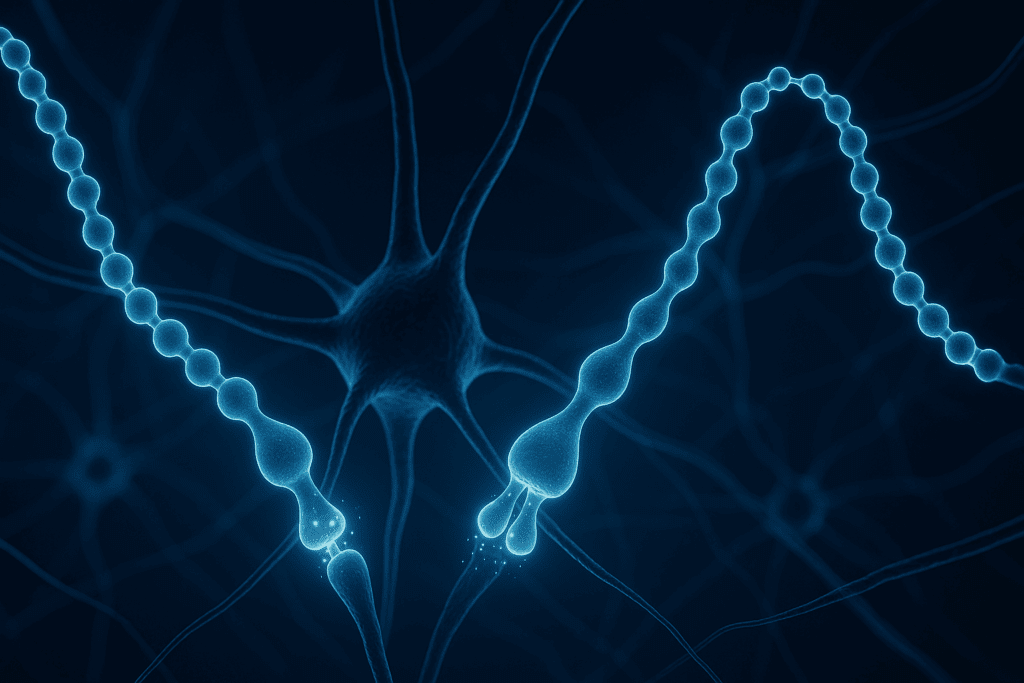
The Emerging Promise of Peptide-Based Nootropics in Anxiety Support
Peptide-based nootropics represent a new frontier in cognitive enhancement and emotional regulation. These short chains of amino acids act as signaling molecules, influencing everything from immune function to neurotransmitter release. While some are still in experimental phases, others like Semax and Selank—both developed in Russia—have shown significant promise for treating anxiety and enhancing cognitive resilience.
Selank, for instance, is an analog of tuftsin, a naturally occurring immunomodulatory peptide. It has demonstrated both anxiolytic and nootropic effects in clinical settings by modulating the GABAergic and serotonergic systems. Unlike benzodiazepines, Selank does not cause sedation or withdrawal, making it a compelling candidate for long-term anxiety management.
While access to peptide nootropics may currently be limited in some countries, their rise underscores a growing interest in precision-based, highly targeted brain supplements. As research continues, peptide formulations may soon join the ranks of the best nootropics for anxiety, especially for individuals seeking non-traditional, highly effective alternatives.
Rethinking Anxiety as a Metabolic and Inflammatory Disorder of the Brain
One of the most significant shifts in neuroscience over the past decade is the recognition that anxiety is not merely a psychological phenomenon but also a metabolic and inflammatory condition. Chronic psychological stress activates microglia—the brain’s resident immune cells—leading to neuroinflammation and oxidative stress that impair synaptic plasticity and neurotransmitter balance.
This means that the best nootropics for anxiety are often those that exert anti-inflammatory and antioxidant effects in addition to neurotransmitter modulation. For example, compounds such as N-acetylcysteine (NAC) have gained attention for their ability to increase glutathione—the brain’s master antioxidant—while also influencing glutamate transmission, a key component in both anxiety and cognition. Several clinical studies have shown NAC’s potential to reduce symptoms in generalized anxiety disorder, obsessive-compulsive disorder, and even post-traumatic stress disorder.
Likewise, polyphenols such as quercetin and resveratrol—typically found in deeply pigmented plants and fruits—offer anxiolytic benefits through their role in modulating inflammatory cascades and improving mitochondrial function. These compounds are not traditionally viewed as nootropics, yet they fulfill a dual function: calming the inflamed brain while supporting long-term neuronal integrity.
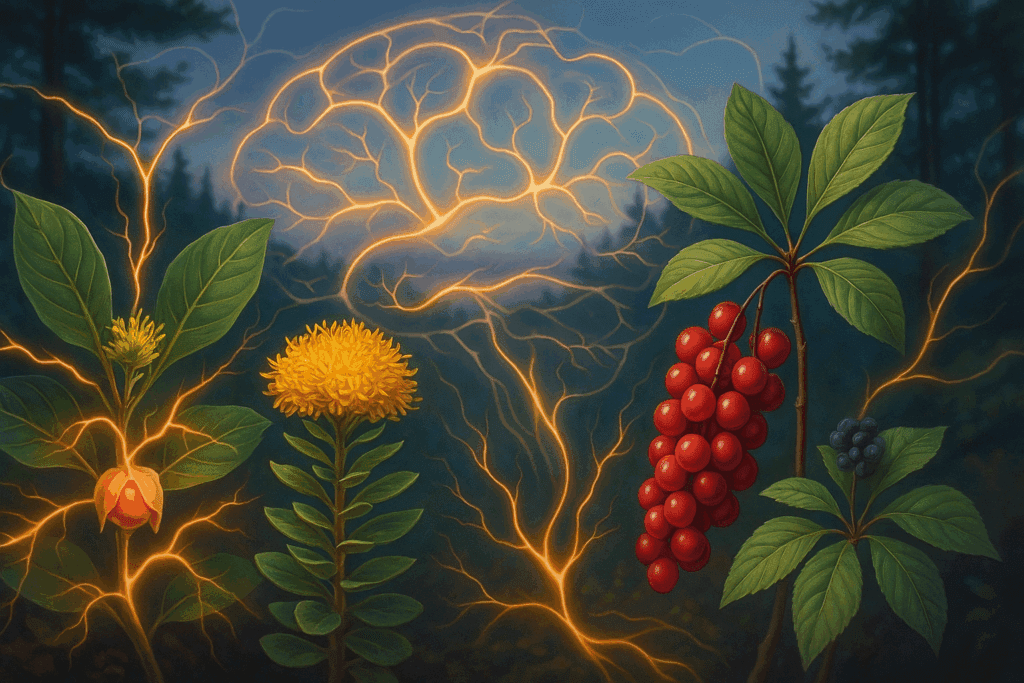
Adaptogens and Anxiolytics: A Close Look at Nature’s Most Promising Nootropic Allies
Among the most well-researched nootropics for anxiety, adaptogens hold a prominent position. These botanicals help the body adapt to stress by modulating the HPA axis and enhancing resilience to mental and physical challenges. Ashwagandha (Withania somnifera), long revered in Ayurvedic medicine, has garnered robust clinical support for its anxiolytic and cortisol-lowering effects. In randomized controlled trials, ashwagandha supplementation has been associated with significant reductions in perceived stress, anxiety scores, and even serum cortisol levels, all without impairing cognitive function.
Rhodiola rosea, another adaptogen with a strong nootropic profile, operates through a different yet complementary mechanism. By enhancing the efficiency of neurotransmitter transport systems and modulating monoamine levels, Rhodiola helps balance mood and increase energy, especially under conditions of fatigue and stress. Importantly, it achieves this without overstimulation—a crucial feature for individuals whose anxiety is exacerbated by typical stimulants like caffeine.
Eleuthero (Siberian ginseng) and Schisandra chinensis, though less widely known, also demonstrate anxiolytic potential. Their mechanisms involve modulating catecholamines such as dopamine and norepinephrine while improving cellular resistance to stress-induced oxidative damage. These herbs are often found in synergistic blends that target both immediate stress relief and long-term cognitive vitality.
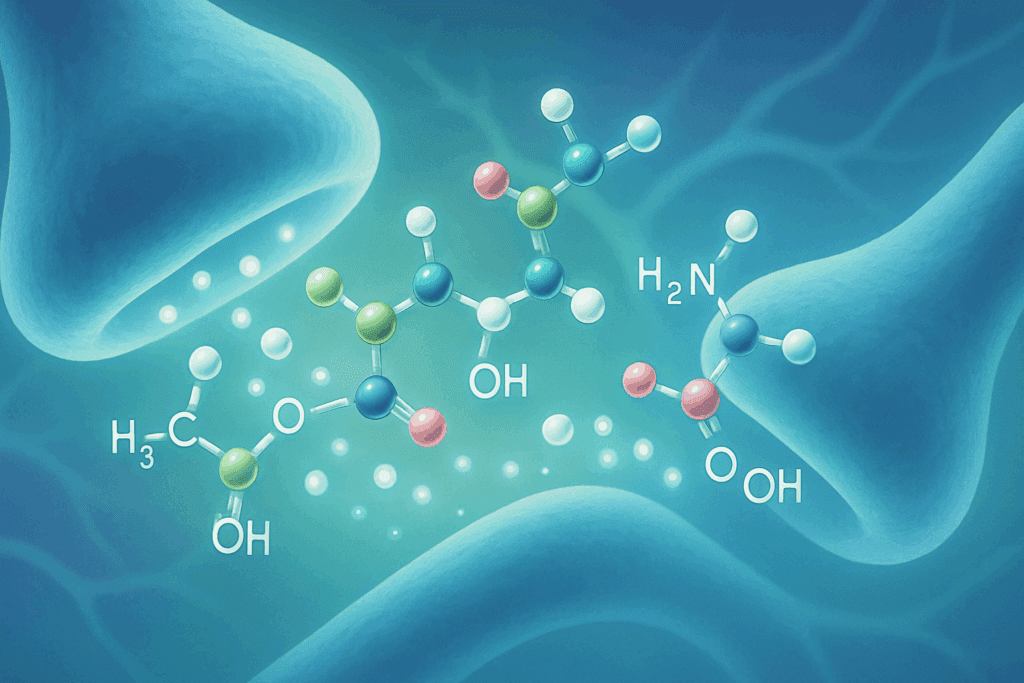
Amino Acid Nootropics: Building Blocks for Calm and Cognitive Clarity
Amino acids are not just the structural components of proteins—they also serve as critical precursors to neurotransmitters that regulate mood and cognition. In the realm of nootropics for anxiety, certain amino acids stand out for their ability to promote calm without sedation.
L-theanine, found almost exclusively in green tea, is a prime example. Its anxiolytic effects stem from its ability to increase alpha brainwave activity—associated with relaxation and wakeful calm—while modulating levels of dopamine, serotonin, and GABA. Studies have shown that L-theanine can reduce physiological and subjective markers of stress, especially in high-pressure scenarios, without impairing focus. This makes it particularly valuable for individuals seeking to stay mentally sharp while mitigating anxiety.
GABA itself, the brain’s primary inhibitory neurotransmitter, is another compound of interest. Although there has been debate about the bioavailability of supplemental GABA crossing the blood-brain barrier, emerging research suggests that even peripheral effects may contribute to systemic relaxation and vagal tone regulation. Moreover, liposomal and phenylated forms of GABA are now being developed to enhance brain uptake, offering new hope for its use as an effective nootropic for anxiety.
Taurine, an amino sulfonic acid found abundantly in the brain, also merits attention. It modulates GABAergic activity, supports neurogenesis, and exhibits antioxidant properties. In animal studies, taurine has been shown to reduce anxiety-like behavior and protect against stress-induced neuronal damage. When used in combination with other nootropics, taurine may amplify both calming and neuroprotective effects.
Chrono-Nootropics: Timing Supplementation to Align with Biological Rhythms
Timing plays a crucial role in both the effectiveness and safety of any supplement. The field of chrono-nootropics explores how aligning nootropic intake with the body’s natural circadian rhythms can amplify their benefits for anxiety and cognition.
For example, taking L-theanine or GABA closer to the evening may enhance sleep quality by promoting parasympathetic nervous system dominance. Meanwhile, compounds that support cortisol balance—such as phosphatidylserine or ashwagandha—are best taken earlier in the day to prevent nighttime overstimulation.
Even brain-boosting nutrients like magnesium and zinc show time-dependent absorption and effects, particularly when taken in relation to meals or hormonal fluctuations. Women, in particular, may benefit from cycling their nootropic intake in harmony with the menstrual cycle, since hormonal shifts across the luteal and follicular phases significantly influence anxiety levels and cognitive performance.
Chrono-nootropic strategies are still under-researched but hold great promise, especially for individuals seeking to maximize the efficacy of their nootropics for anxiety while minimizing side effects or tolerance.
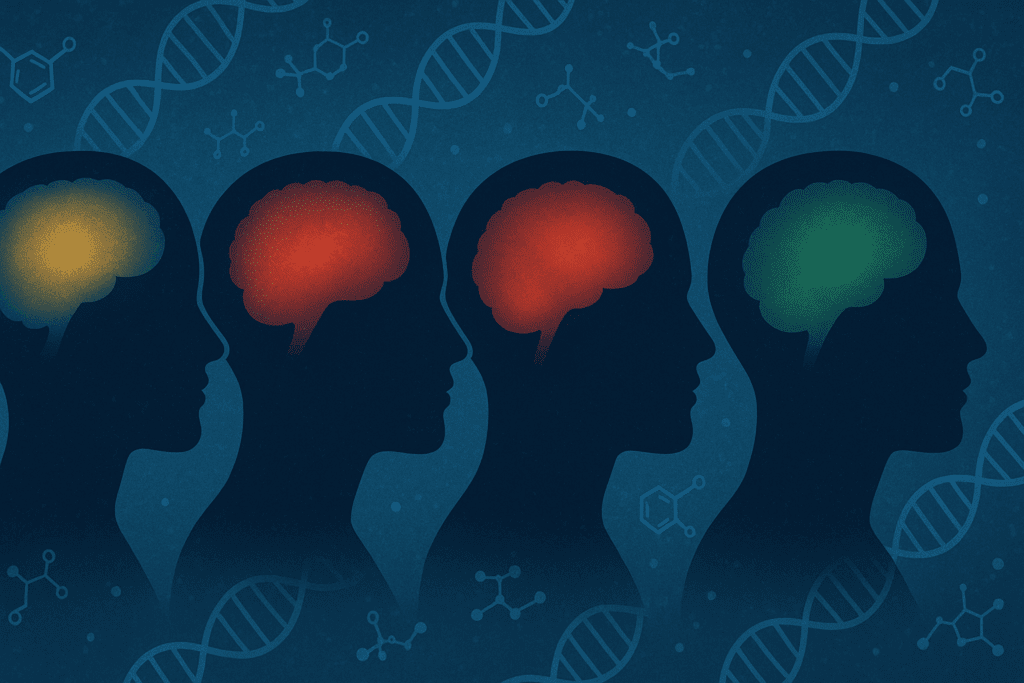
Customizing Nootropic Strategies Based on Anxiety Subtypes
Not all anxiety is created equal. Generalized anxiety disorder (GAD), social anxiety, panic disorder, and high-functioning stress all involve different neurological and biochemical patterns. As such, personalized nootropic strategies are often more effective than a one-size-fits-all approach.
For example, individuals with GAD may benefit most from adaptogens and amino acids that stabilize baseline cortisol levels and promote GABAergic activity. In contrast, those with panic disorder may respond better to fast-acting anxiolytics like L-theanine or GABA analogs that help disrupt acute stress cycles.
Social anxiety may involve more dysregulation of dopamine and serotonin, suggesting a potential role for compounds like Rhodiola rosea or 5-HTP (5-hydroxytryptophan). Meanwhile, high-performing professionals experiencing burnout may gravitate toward stacks that combine ashwagandha with B-complex vitamins, omega-3s, and acetyl-L-carnitine for mitochondrial and adrenal support.
Genetic testing services like Genomind or DNAfit can provide insights into neurotransmitter polymorphisms that influence anxiety expression, helping users choose the best nootropics for anxiety based on their unique neurochemistry.
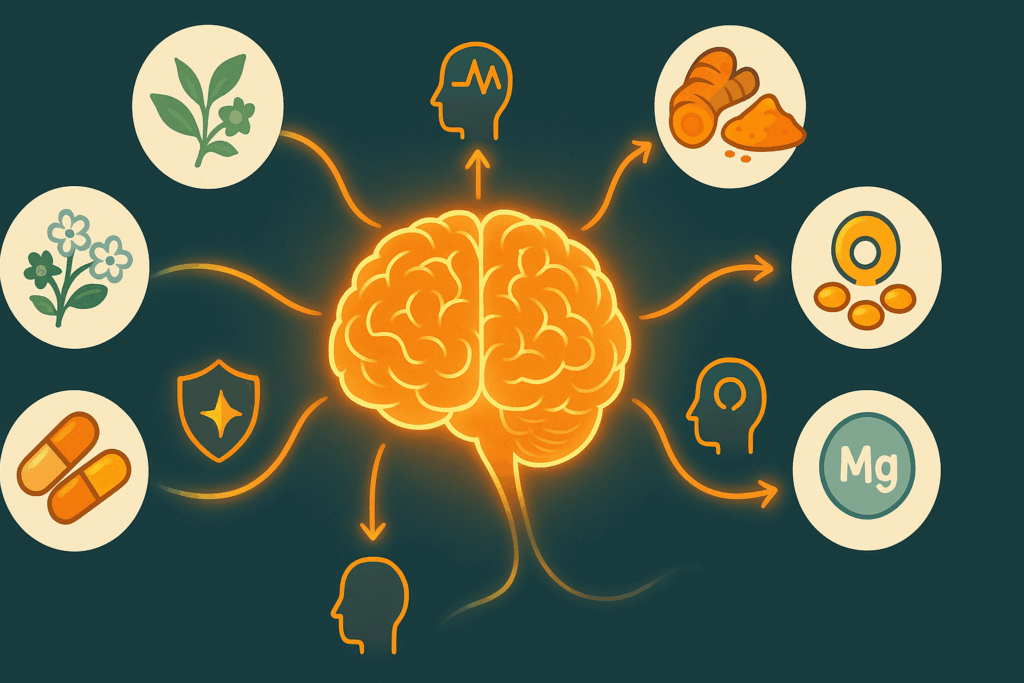
Botanical and Nutraceutical Synergies: How Formulations Enhance Efficacy
Many nootropic users—and increasingly, supplement manufacturers—are turning to thoughtfully formulated blends that combine multiple anxiolytic and cognitive-enhancing ingredients. These synergistic combinations are designed to target multiple biochemical pathways simultaneously, improving efficacy while minimizing the need for high doses of any one compound.
A well-balanced nootropic stack might include L-theanine for immediate calm, Bacopa monnieri for memory support and stress resilience, and phosphatidylserine to reduce cortisol and improve executive function. Such blends may also incorporate magnesium threonate or magnesium glycinate—forms of magnesium known to cross the blood-brain barrier and play a crucial role in NMDA receptor regulation, which is tightly linked to both anxiety and learning.
Curcumin, derived from turmeric, is often included for its potent anti-inflammatory effects and its ability to increase brain-derived neurotrophic factor (BDNF), which supports synaptic plasticity and mood regulation. Likewise, omega-3 fatty acids, particularly EPA and DHA, have been shown to reduce inflammation, support membrane fluidity in neuronal cells, and correlate with lower rates of anxiety and depression.
By combining these compounds in strategic ways, it is possible to create nootropic regimens that provide both immediate stress reduction and long-term neuroprotection. However, personalization remains key. Genetic, lifestyle, and psychological variables all influence how an individual responds to specific nootropics for anxiety. Consulting with a healthcare provider knowledgeable in nutritional psychiatry or functional medicine is advisable when developing a tailored nootropic protocol.
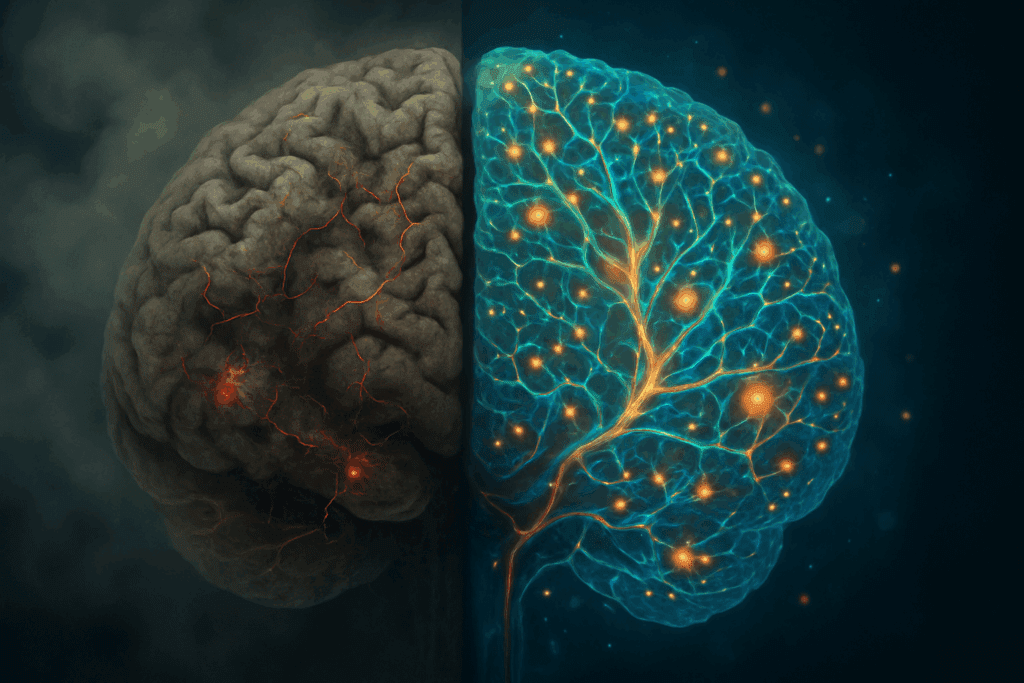
Cognitive Longevity and the Hidden Cost of Chronic Anxiety
While most people think of anxiety in terms of immediate discomfort—racing thoughts, tight muscles, restless sleep—the long-term consequences of chronic anxiety on brain health are often overlooked. Prolonged activation of stress pathways accelerates hippocampal atrophy, impairs neurogenesis, and promotes neuroinflammation—all of which are key contributors to age-related cognitive decline. In this context, using the best nootropics for anxiety is not simply about soothing the nerves; it’s about safeguarding cognitive function decades down the line.
High-functioning individuals often ignore low-grade, persistent anxiety until it begins to interfere with memory, productivity, or sleep. Unfortunately, by the time these symptoms manifest, some degree of neural degradation may already be underway. Early intervention using neuroprotective nootropics may help to mitigate this trajectory, especially when paired with lifestyle interventions like mindfulness, regular exercise, and proper sleep hygiene.
The concept of “calm cognition”—a state of relaxed alertness—is central to this preventive philosophy. Nootropics such as lion’s mane mushroom, which promotes nerve growth factor (NGF), and citicoline, which supports phospholipid synthesis and mitochondrial function, exemplify this dual-purpose strategy. They reduce stress-related impairments while laying the groundwork for enhanced mental resilience in later life. When combined with anti-inflammatory compounds and adaptogens, such nootropics form the cornerstone of a proactive approach to cognitive longevity.
Clinical Evidence and Safety Considerations: What the Research Really Says
Despite the growing popularity of nootropics for anxiety, not all claims are backed by rigorous science. It’s essential to distinguish between anecdotal enthusiasm and clinically validated efficacy. Fortunately, a growing body of peer-reviewed research now supports the use of specific nootropics for reducing anxiety symptoms and enhancing cognitive function.
For example, a 2019 meta-analysis published in the Journal of Clinical Psychopharmacology found that ashwagandha produced statistically significant reductions in anxiety compared to placebo, with minimal adverse effects. Similarly, L-theanine has been evaluated in multiple double-blind studies showing reductions in both subjective stress and salivary cortisol levels, particularly in high-stress occupational settings.
Bacopa monnieri has been studied not just for its memory-enhancing effects but also for its ability to reduce anxiety in both healthy adults and individuals with cognitive impairment. The mechanism appears to involve serotonergic modulation and antioxidant activity, rather than simple sedation, making it a safer long-term option for stress-related concerns.
Safety remains a crucial consideration, especially for individuals already taking prescription medications or managing chronic health conditions. While most nootropics have favorable safety profiles, interactions are possible—particularly with SSRIs, benzodiazepines, or anticholinergic drugs. Therefore, sourcing high-quality, third-party tested supplements and consulting with a healthcare provider remains a foundational best practice.
Ethical Considerations and Responsible Use of Nootropics for Anxiety
As interest in nootropics grows, so too does the need for ethical consideration. Unlike prescription medications, most nootropics are available over the counter, leading to a surge in self-experimentation. While this democratization of brain health has many benefits, it also carries risks.
Users must be cautious about sourcing—ensuring that supplements are third-party tested and free from contaminants. Overdosing, stacking without proper knowledge, or using nootropics as a crutch to push through burnout can all backfire, exacerbating anxiety rather than alleviating it.
Responsible use of nootropics for anxiety also means integrating them within a broader lifestyle context—balancing supplementation with healthy sleep, nutrition, physical activity, and emotional self-care. Supplements are not panaceas; they are tools best used in the service of long-term mental wellness, not short-term performance hacks.
Frequently Asked Questions: Nootropics for Anxiety and Cognitive Health
1. Can nootropics for anxiety enhance emotional intelligence and social adaptability?
Yes, certain nootropics for anxiety may indirectly improve emotional intelligence and social functioning by reducing overactive stress responses that often hinder interpersonal engagement. Chronic anxiety can narrow emotional perception and lead to avoidance behaviors that reduce social learning opportunities. Nootropics like L-theanine, Rhodiola rosea, and phenibut (used cautiously and legally where permitted) may improve mood stability, which in turn enhances one’s ability to interpret emotional cues and engage more confidently in social environments. While no supplement can replace therapeutic practices like cognitive-behavioral therapy, integrating the best nootropics for anxiety into a daily routine can create a physiological foundation for more adaptive emotional responses and improved social fluency. This may be especially beneficial for professionals in high-stakes roles who must maintain composure and empathy under pressure.
2. How do nootropics for anxiety affect creativity and divergent thinking?
Interestingly, some of the best nootropics for anxiety also support creativity by reducing cognitive rigidity and promoting a relaxed state of mind conducive to idea generation. Compounds like L-theanine and low-dose ashwagandha reduce the mental “noise” of intrusive thoughts, helping the brain shift into alpha brainwave states associated with creativity. This mental state allows for more flexible thinking, pattern recognition, and imaginative problem-solving—traits often diminished during heightened anxiety. While anxiolytic nootropics are not directly marketed as creativity enhancers, their ability to induce a calm cognitive environment makes them a powerful tool for artists, writers, and innovators seeking flow states. As a result, combining nootropics for anxiety with creative rituals can deepen the quality and spontaneity of output.
3. Are there nootropics for anxiety specifically beneficial for perimenopausal and menopausal women?
Absolutely. Hormonal transitions during perimenopause and menopause often intensify anxiety due to fluctuations in estrogen, which influences serotonin, dopamine, and GABA—all of which are closely tied to mood regulation. Some of the best nootropics for anxiety in this population include phosphatidylserine for cortisol modulation, L-theanine for gentle calming without sedation, and saffron extract, which has shown promise in balancing mood during hormonal shifts. Adaptogens like Rhodiola and maca root can also support adrenal function, which is critical during menopause when the ovaries reduce hormone output. Choosing nootropics tailored to hormonal life stages can create a safer, more effective approach to managing anxiety and cognitive decline in aging women.
4. Can nootropics for anxiety help with sleep quality and circadian rhythm regulation?
Yes, several nootropics known for their anxiolytic effects also support improved sleep patterns, which is crucial since anxiety often disrupts circadian rhythms. For example, magnesium threonate, L-theanine, and GABA help calm the nervous system before bedtime, while melatonin precursors like tryptophan or 5-HTP support serotonin metabolism and sleep onset. These compounds promote deeper, more restorative sleep without the risk of dependency associated with sedatives. Moreover, consistent use of calming nootropics can help re-entrain the body’s natural sleep-wake cycle, particularly when paired with good sleep hygiene and morning light exposure. In this sense, the best nootropics for anxiety also function as natural tools for supporting long-term circadian health.
5. How do nootropics for anxiety compare to traditional anti-anxiety medications in terms of neuroadaptation?
One of the most significant advantages of nootropics for anxiety is that they tend to produce less neuroadaptation—or tolerance buildup—compared to many pharmaceutical anxiolytics. Medications like benzodiazepines often downregulate GABA receptors with long-term use, leading to diminished effects and potential dependence. In contrast, the best nootropics for anxiety, such as bacopa, L-theanine, and ashwagandha, support homeostasis rather than overriding neurotransmitter function. This means they often retain their benefits over time without the need for escalating doses. However, some nootropics—like phenibut or kratom—do carry a risk of dependence and should be used with caution. Overall, the low adaptation risk makes natural nootropics a compelling option for long-term anxiety support.
6. Are there nootropic strategies to support anxiety reduction in high-performance or competitive environments?
Yes, managing anxiety in high-performance environments like athletics, law, or corporate leadership often requires a nuanced blend of cognitive stimulation and emotional control. The best nootropics for anxiety in these settings include compounds that enhance stress resilience without compromising decision-making speed. Rhodiola rosea is especially valuable for maintaining endurance under psychological and physical strain, while L-tyrosine replenishes dopamine during periods of cognitive fatigue. When paired with adaptogens and mild cholinergics like citicoline, these compounds create a performance-ready brain state—calm but alert. Unlike stimulants that may heighten anxiety, these nootropics offer a subtler edge suited for sustained mental output and composure in pressure-filled contexts.
7. What role does diet play in amplifying or diminishing the effects of nootropics for anxiety?
Diet significantly influences how effectively nootropics for anxiety are absorbed and utilized by the body. Nutrient-dense foods rich in omega-3 fatty acids, magnesium, and B-vitamins can enhance neurotransmitter function and make the brain more receptive to supplementation. Conversely, diets high in sugar, trans fats, or processed carbohydrates may increase systemic inflammation and blunt the effects of even the best nootropics for anxiety. For optimal results, users should pair nootropics with a brain-friendly diet—one that includes leafy greens, fatty fish, fermented foods, and complex carbohydrates to maintain stable blood glucose levels. This integrative approach helps stabilize mood, reduces inflammatory cascades, and strengthens the overall efficacy of the supplement regimen.
8. Can nootropics for anxiety be used as part of post-traumatic stress recovery strategies?
While not a substitute for trauma-focused therapies, nootropics for anxiety may complement PTSD recovery by helping regulate hyperarousal and supporting neural repair. Certain compounds like NAC (N-acetylcysteine), magnesium glycinate, and lion’s mane mushroom show promise in reducing oxidative stress and promoting neurogenesis in stress-damaged areas of the brain. These supplements may also assist in reducing the emotional reactivity that characterizes PTSD flashbacks or panic episodes. For individuals with trauma-related anxiety, the best nootropics for anxiety will be those that address both neurochemical imbalances and the brain’s plastic response to prolonged stress. As always, these should be introduced under clinical guidance alongside psychotherapy for a comprehensive recovery plan.
9. How should individuals cycle or rotate their use of nootropics for anxiety to prevent tolerance or diminished effectiveness?
Cycling nootropics—alternating or pausing usage—can be an effective way to maintain their efficacy over time. While many of the best nootropics for anxiety do not build tolerance in the same way pharmaceuticals might, it’s still beneficial to cycle adaptogens like Rhodiola or bacopa every few weeks. This might mean using a compound for five days and taking two off, or pausing completely after six weeks to reassess needs and effects. Additionally, rotating between nootropics with different mechanisms—such as switching from a GABAergic compound to a serotonin-modulating one—can reduce receptor fatigue. This approach helps preserve the long-term benefits of nootropics for anxiety while avoiding stagnation or habituation.
10. What trends are emerging in next-generation nootropics for anxiety, and how might they shape future treatment options?
Future developments in nootropics for anxiety are moving toward more targeted, biotechnology-driven solutions. Peptide-based nootropics like Selank and Semax are showing great promise in clinical settings for rapid, non-sedating anxiety relief through highly specific neural pathways. Meanwhile, research into the endocannabinoid system is leading to novel cannabinoid-based nootropics that may offer anxiolytic effects without the psychoactive drawbacks of THC. Personalized nootropic stacks, developed using AI and genetic profiling, are also on the horizon, allowing users to fine-tune their regimen based on unique neurochemical and hormonal profiles. As the field grows, we may soon see the best nootropics for anxiety not just as supplements, but as precision-medicine tools that integrate seamlessly into mental health care frameworks.
Conclusion: Why the Best Nootropics for Anxiety Are Also Tools for Lifelong Brain Health
In the end, the conversation about nootropics for anxiety transcends the narrow goal of temporary relief. It opens a broader dialogue about what it means to live with mental clarity, emotional resilience, and sustained cognitive vitality. The best nootropics for anxiety do not simply blunt the symptoms of stress; they nurture the neurological foundations of calm focus and long-term brain health.
As our understanding of the brain deepens and the stigma around anxiety begins to fade, more people are seeking holistic, evidence-based approaches that go beyond the pharmaceutical paradigm. Nootropics, when chosen thoughtfully and used responsibly, offer a promising middle path—one that embraces both ancient wisdom and modern neuroscience.
By integrating compounds that soothe the overactive stress response, promote neuroplasticity, and protect against age-related decline, nootropic regimens can serve not only as daily allies against anxiety but also as investments in cognitive longevity. In doing so, they provide a vision of mental health that is proactive, empowering, and aligned with the rhythms of a modern life lived consciously.

